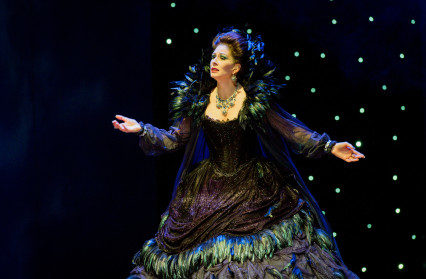Nigel Jarrett was at the Wales Millennium Centre to review a Welsh National Opera performance of Mozart’s The Magic Flute.
A couple of factors explain why Welsh National Opera have revived Dominic Cooke’s colourful production of The Magic Flute for the second time this year. It’s one that asks to be dusted down and brought out regularly, like other company shows in recent times, notwithstanding that little of their output these days deserves to be lost for ever. There’s no reason why those who didn’t or couldn’t see it at the beginning of this year should not be given an opportunity a few months later, especially as its pantomimic quality sits even more comfortably in a season that also includes a new operatic version of Peter Pan by Richard Ayres (directed by Keith Warner), which is not strictly a panto-opera but has a character called Captain Hook, who can make a hollow pretence of being scary for any young kids in the audience.
Cooke’s 2005 production, however, is not so much aimed deliberately at the young or young-at-heart as an attempt to give the work’s low comedy a funnier face and to raise smiles at its high seriousness. A gap is bridged, and that’s a theatrical achievement, maybe long overdue. What is lost in the process might be debateable, but it would be a debate bedazzled by vivid stage pictures and hilarious goings-on, of which the substitution of a giant lobster for Schikaneder’s raptorial serpent in the opening of Act One by designers Julian Crouch and Kevin Pollard is the first of many that faintly echo the odd visual world of the artist René Magritte. But that connection shouldn’t be over-emphasised: Magritte’s work appears to have been stimulus and inspiration as that of a fun artist, not anything deeper or more complicated.
Any reservations would have to centre on the designers’ vision, with its trap doors, raunchily-petticoated Three Ladies and its Brotherhood got up in orange Masonic garb (the colour-chart equivalent of the rolled-up trouser leg), and the feeling that it sometimes threatens to smother the story Mozart’s music is telling; so that the audience is receiving two simultaneous impressions – one pointedly musical, the other luminously visual – that are not always complementary. Moreover, the way Jeremy Sams’s English translation leavens the atmosphere of psychobabble means that even more laughs are offered as the protagonists confront and deal with the opera’s weird procession of characters, from the quaint menagerie to the three boy guides aloft on their Heath-Robinson cycle and resembling renegades from the Vienna Boys Choir – or a scene from Peter Pan. As a bogeyman, the cadaverous Monostatos is in the same league as Ayres’s Hook.
The strength of this season’s cast is its equivalence, Benjamin Hulett’s ardent Tamino matched by the determined athleticism (and accuracy in those stratospheric high Fs) of Samantha Hay’s Queen of the Night. Elizabeth Watts’s Pamina contrasts in its vulnerability with Claire Hampton’s bubbly and wily Papagena, while Daniel Grice as Papageno is just about a loopy dead-ringer for Harpo Marx, which makes the Act One episode of his enforced silence even more risible. On this opening night, Hay was replacing the unwell Kathryn Lewek and evidently relished a further outing in a part she sang spiritedly for Welsh National Opera last season. Scott Wilde’s Sarastro is ponderous and world-weary rather than imperial; it’s a tough life maintaining what is good and enlightened, especially with henchmen like Monostatos, who is played by Howard Kirk as the nastiest of nasty pieces of work (hiss ‘n’ boo branch).
With parts such as the Three Ladies (Camilla Roberts, Máire Flavin and Emma Carrington) and the trouser-roled boys (Rachel Mills, Katrina Nimmo, Jennifer Bianco) making a strong presence, the other roles, including the chorus and its promoted members, fall neatly into place, resulting overall in an ensemble piece with pace and energy on a set which, if a tad claustrophobic, concentrates attention even when the serious parts move to a higher level amid the remnants, real or recalled, of the comic goings-on.
The implication of Singspiel is that the spoken dialogue, where Sams is at his most idiomatic, should be clearly heard, and since there are surtitles in English (and Welsh in Wales) for the translation, there’s a case in this instance for the not uncommon practice of singing in German and speaking in English. On the form displayed here, the attention to tone and tempo of conductor Simon Phillippo and the orchestra would deal with the issue either way, especially in keeping up with Cooke’s refusal to let anyone hang about.
This production will eventually go the way of all other operatic exercises. There’s no definitive version of The Magic Flute, not the least interesting aspect of which is the patronising idea that all Everyman wants is an easy life that avoids the moral entanglements of his more complicated betters (though the imagined domestic life of this Papageno and Papagena is going to be more than a handful). There’s no doubt some director somewhere is already considering that as a ‘Flute theme worthy of exploration.
Photo of Samantha Hay as Queen of the Night by Robert Workman
Wales Millennium Centre, Cardiff, May 22 2015
Magic Flute
Music: WA Mozart
Libretto: Emanuel Schikaneder
English translation: Jeremy Sams
Director: Dominic Cooke
Conductor: Simon Phillippo
Cast includes: Samantha Hay (deputising) / Elizabeth Watts / Daniel Grice / Benjamin Hulett / Claire Hampton / Howard Kirk / Scott Wilde / Ashley Holland / Camilla Roberts / Máire Flavin / Emma Carrington / Rachel Mills / Katrina Nimmo / Jennifer Bianco



 Enjoyed this article? Support our writers directly by buying them a coffee and clicking this link.
Enjoyed this article? Support our writers directly by buying them a coffee and clicking this link.







